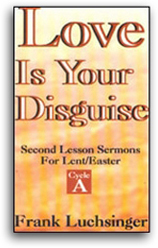SermonStudio
The Day God Forgot
Sermon
Love Is Your Disguise
Second Lesson Sermons For Lent/Easter
Two boys are racing their bicycles. Spring has sprung and they feel the gentle warmth of late afternoon rushing past their ears as they barrel down the street. Just in front of them are two home-made ramps, and beyond the ramps, a finish line. They're both standing now to exert a little more force on the pedals. Gracefully into the air flies one, as the other begins to rotate slightly. Landing straight and pushing onto the finish line is only one of the riders. The other lands, bounces, flips, groans, the right arm bending where one should not have a bend. Immediately tears.


